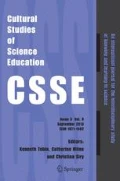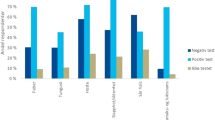Abstract
Tom G. K. Bryce and Stephen P. Day’s (2013) original article on scepticism and doubt in science education explores the context of citizens’ attitudes towards the complexities and uncertainties of global issues, namely global warming. This response aims to stimulate reflection on some of the implicit assumptions underpinning the relationships between science, technology and the public. I argue that an underestimation of the political and ethical dimensions of science and technology limits the possibilities for education to set the agenda for citizens’ participation in science and technological matters. Drawing on Sheila Jasanoff’s model of co-production, this paper proposes a radical re-affirmation of the aims and purposes of science education to embrace a multiplicity of disciplines, narratives and ways of knowing in science, technology and society issues.
Similar content being viewed by others
References
Aikenhead, G. (2006). Science education for everyday life: Evidence-based practice. New York: Teachers College Press.
Baker, L., Dove, M., Graef, D., Keleman, A., Kneas, D., Osterhoudt, S., et al. (2013). Whose diversity counts? The politics and paradoxes of modern diversity. Sustainability, 5, 2495–2518. doi:10.3390/su5062495.
Barth, M., & Michelsen, G. (2013). Learning for change: An educational contribution to sustainability science. Sustainability Science, 8, 103–119. doi:10.1007/s11625-012-0181-5.
Bateson, G. (2000). Steps to an ecology of mind. Chicago: University of Chicago Press.
Bauer, H. H. (2006). The two-edged sword of Skepticism: Occam’s razor and occam’s lobotomy. Journal of Scientific Exploration, 20, 421–427. doi:http://www.scientificexploration.org/journal/jse_20_3_bauer.pdf.
Beck, U. (1992). Risk society. Towards a new modernity. London: Sage.
Benessia, A. & Funtowicz, S. (2013). Ottimizzare, sostituire e sconfiggere. I proiettili d’argento dell’innovazione. In S. Jasanooff, A. Benessia, & S. Funtowicz (Eds.), L’innovazione tra utopia e storia (pp. 55–123). Torino: Edizioni Codice.
Biesta, G. J. J. (2006). Beyond learning. Boulder, CO: Paradigm Publishing.
Clark, B., & York, R. (2005). Carbon metabolism: Global capitalism, climate change, and the biospheric rift. Theory and Society, 34, 391–428.
Contu, S., & Camino, E. (2013). Sustainability: from the imaginaries to the indicators… and back? The case of India. Paper presented at the III Congress of the Italian University Network for Development Cooperation (CUCS), Turin, (pp. 19–21) Sep 2013.
Dalhstrom, M. F., & Ho, S. S. (2012). Ethical Considerations of using narrative to communicate science. Science Communication, 34(5), 592–617. doi:10.1177/1075547012454597.
Douguet, J. M., O’Connor, M., Noel, F. (2008). Système de valeurs et modes de régulation: vers une économie politique écologique. Cahiers du C3ED, UVSQ.
Elowitz, M., & Wendell, E. L. (2010). Build life to understand it. Nature, 468, 889–890.
Engelman, R. (2013). The Sustainability Metric. In The World Watch Institute (Ed.), State of the world 2013: Is sustainability still possible?. London: Island Press.
Feyerabend, P. (1975). Against method. London: Verso.
Fielding, M. (2004). Transformative approaches to student voice: Theoretical underpinnings, recalcitrant realities. British Education Research Journal, 30, 295–311. doi:10.1080/0141192042000195236.
Gabrys, J., & Yusoff, K. (2012). Arts, sciences and climate change: Practices and politics at the threshold. Science as culture, 21(1), 1–24. doi:10.1080/09505431.2010.550139.
Hak, T., Moldan, B., & Dahl, A. L. (2012). Editorial. Ecological indicators, 17, 1–3.
Hamilton, C. (2013). Why Geoengineering has immediate appeal to China. The Guardian, Friday 22 March.
Hornborg, A. (2009). Zero-sum world: Challenges in conceptualising environmental load displacement and ecological unequal exchange in the world system. International Journal of Comparative Sociology, 50(3–4), 237–262. doi:10.1177/0020715209105141.
Hulme, M. (2011). Reducing the future to climate: A story of climate determinism and reductionism. Osiris, 26, 245–266. doi:10.1086/661274.
Hung, R. (2010). In search of affective citizenship: from the pragmatist–phenomenological perspective. Policy futures in Education, 5, 488–497. http://dx.doi.org/10.2304/pfie.2010.8.5.488.
Ingold, T. (2004). Culture on the ground: The world perceived through the feet. Journal of Material Culture, 9, 315–340. doi:10.1177/1359183504046896.
Jasanoff, S. (2004). States of knowledge. The co-production of science and social order. London: Routledge.
Jasanoff, S. (2005). Designs on nature: Science and democracy in Europe and the United States. Princeton: Princeton University Press.
Jasanoff, S. (2012). Science and public reason. Abingdon: Routledge.
Jasanoff, S. (2013). Beni incalcolabili. Reimmaginare il nostro futuro tecnologico. In S. Jasanoff, A. Benessia, & S. Funtowicz (Eds.), L’Innovazione tra utopia e storia (pp. 1–65). Torino: Edizioni Codice.
Kahan, D. (2012). Why we are poles apart on climate change. Nature, 255, 488.
Kiyashchenko, L. P. (2011). An essay in the philosophy of transdisciplinarity (the “bioethics” as a casus). Transdisciplinary Journal of Engineering and Science, 2, 61–69.
Kontra, C., Goldin-Meadow, S., Beilock, S. (2012). Embodied learning across the life span. Topics in Cognitive Science, 1–9. doi: 10.1111/j.1756-8765.2012.01221.
Laidler, G. J. (2006). Inuit and scientific perspectives on the relationship between sea ice and climate change: The ideal complement? Climatic Change, 78, 407–444. doi:10.1007/s10584-006-9064-z.
Latour, B. (2004). Why has critique run out of steam? From matters of fact to matters of concern. Critical Inquiry, 30, 225–248. doi:http://www.bruno-latour.fr/sites/default/files/89-CRITICAL-INQUIRY-GB.pdf.
Levinson, R. (2012). A perspective on knowing about global warming and a critical comment about schools and curriculum in relation to socio-scientific issues. Cultural Studies of Science Education, 7, 693–701. doi:10.1007/s11422-012-9418-y.
Longino, H. E. (2002). The fate of knowledge. Princeton: Princeton University Press.
Losh, S. C., Wilke, R., & Pop, M. (2007). Some methodological issues with ‘Draw a scientist tests’ among young children. International Journal of Science Education, 30(6), 773–792. doi:10.1080/09500690701250452.
Martinez-Alier, J. (2009). Social metabolism, ecological distribution of conflicts and languages of valuation. Capitalism National Socialism, 20(1), 58–87. doi:10.1016/j.ecolecon.2010.09.024.
Merton, R. K. (1973). The sociology of science: Theoretical and empirical investigations. Chicago: University of Chicago Press.
Michaelson, J. (1998). Geoengineering: a climate change Manhattan project. Stanford environmental Law Journal, Jan 1998. Available at http://www.agriculturedefensecoalition.org/sites/default/files/pdfs/16T_1998_Geoengineering_A_Climate_Manhattan_Project_Stanford_1998.pdf.
Monod, J. (1972). Chance and necessity. New York: Bloomsbury.
Ninan, A. S. (2009). Gandhi’s technoscience: Sustainability and technology as themes of politics. Sustainable Development, 17, 183–196. doi:10.1002/sd.381.
Perrow, C. (1984). Normal accidents: Living with high risks technologies. New York: Basic Books.
Redpath, S. M., Young, J., Evely, A., Adams, W. M., Sutherland, W. J., Whitehouse, A., et al. (2013). Understanding and managing conservation conflicts. Trends in Ecology and Evolution, 28(2), 100–109. doi:10.1016/j.tree.2012.08.021.
Shiva, V. (1993). Monocultures of the mind: Perspectives on biodiversity and biotechnology. New York: Palgrave McMillian.
Söderbaum, P., & Brown, J. (2010). Democratising economics: pluralism as a path toward sustainability. Ecological Economics Review, Annals of the New York Academy of Science, 1185, 179–195. doi:10.1111/j.1749-6632.2009.05283.x.
Solow, R. (1973). The Economics of resources or the resources of economics, Ely lecture, Dec 1973.
STOA Workshop. (2011). Making perfect life: European governance challenges in 21st century: Bioengineering. Rathenau Instituut, l’Aia, Available at: http://tinyurl.com/ag8y3lc.
Author information
Authors and Affiliations
Corresponding author
Additional information
This review essay addresses issues raised in Tom Bryce and Stephen Day’s paper entitled: Scepticism and doubt in science and science education: The complexity of global warming as a socio-scientific issue. (doi: 10.1007/s11422-013-9500-0).
Lead Editor: F. Rezende
Rights and permissions
About this article
Cite this article
Colucci-Gray, L. Beyond evidence: a critical appraisal of global warming as a socio-scientific issue and a reflection on the changing nature of scientific literacy in school. Cult Stud of Sci Educ 9, 633–647 (2014). https://doi.org/10.1007/s11422-013-9556-x
Received:
Accepted:
Published:
Issue Date:
DOI: https://doi.org/10.1007/s11422-013-9556-x




